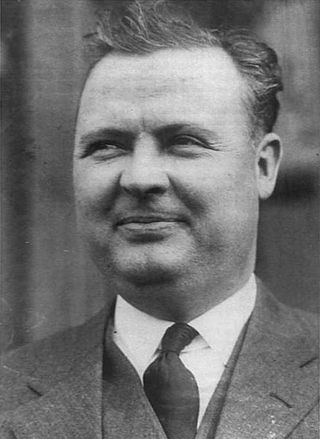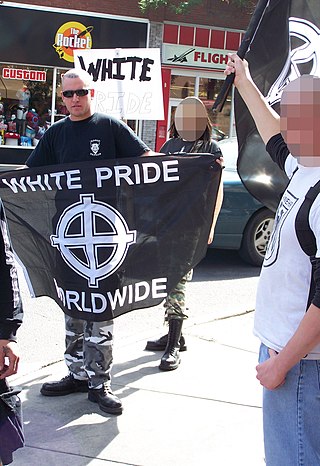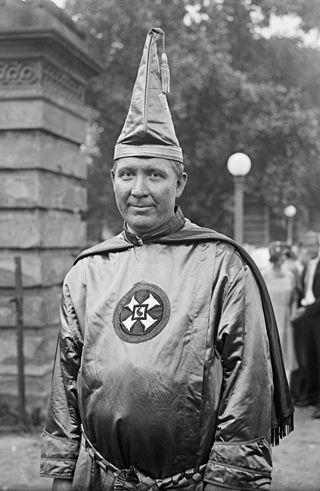
The Ku Klux Klan, commonly shortened to the KKK or the Klan, is the name of several historical and current American white supremacist, far-right terrorist organizations and hate groups. According to historian Fergus Bordewich, the Klan was "the first organized terror movement in American history." Their primary targets at various times have been African Americans, as well as Jews and Catholics.

David Curtis "Steve" Stephenson was an American Ku Klux Klan leader, convicted rapist and murderer. In 1923 he was appointed Grand Dragon of the Indiana Klan and head of Klan recruiting for seven other states. Later that year, he led those groups to independence from the national KKK organization. Amassing wealth and political power in Indiana politics, he was one of the most prominent national Klan leaders. He had close relationships with numerous Indiana politicians, especially Governor Edward L. Jackson.

White pride and white power are expressions primarily used by white separatist, white nationalist, fascist, neo-Nazi, and white supremacist organizations in order to signal racist or racialist viewpoints. It is also a slogan used by the prominent post-Ku Klux Klan group Stormfront and a term used to make racist/racialist viewpoints more palatable to the general public who may associate historical abuses with the terms white nationalist, neo-Nazi, and white supremacist.
A Kleagle is an officer of the Ku Klux Klan whose main role is to recruit new members and must maintain the three guiding principles: recruit, maintain control, and safeguard.
The National Association for the Advancement of White People (NAAWP) is a white supremacist organization established in 1979 by former Ku Klux Klan Grand Wizard David Duke, deriving its name from the National Association for the Advancement of Colored People. It is considered a racist hate group by the Southern Poverty Law Center.

Earle Bradford Mayfield was a Texas lawyer who, from 1907 to 1913, was a Texas State Senator. In 1922, he was elected to the U.S. Senate as a Democrat. He was the first U.S. Senator to be widely considered by the voters to be a member of the revived Ku Klux Klan in the 1920s. Mayfield quietly accepted KKK support but never said he had joined. He was defeated for reelection in 1928 when his opponent attacked his links to the KKK.

Hiram Wesley Evans was the Imperial Wizard of the Ku Klux Klan, an American white supremacist group, from 1922 to his resignation in 1939. A native of Alabama, Evans attended Vanderbilt University and became a dentist. He operated a small, moderately successful practice in Texas until 1920, when he joined the Klan's Dallas chapter. He quickly rose through the ranks and was part of a group that ousted William Joseph Simmons from the position of Imperial Wizard, the national leader, in November 1922. Evans succeeded him and sought to transform the group into a political power.
Mayer Nathan Zald was an American sociologist. He was a professor of sociology, social work and business administration at the University of Michigan, noted for contributions to the sociology of organizations and social movements.

The American Sociological Review is a bi-monthly peer-reviewed academic journal covering all aspects of sociology. It is published by SAGE Publications on behalf of the American Sociological Association. It was established in 1936. The editors-in-chief are Arthur S. Alderson and Dina G. Okamoto.
Mobilization is an academic journal that publishes original research and academic reviews of books concerned mainly with sociological research on protests, social movements, and collective behavior.
Daniel J. Myers is the President of Misericordia University in Dallas, Pennsylvania and a professor of Sociology. His best known research is on the urban unrest of the 1960s and the media coverage of those riots, specializing in identifying the patterns of unrest diffusion. He has written several books and articles, and is co-author of the best-selling sociological social psychology textbook, Social Psychology.
Kathleen Marie Blee is an American sociologist. She is a Distinguished Professor of Sociology at the University of Pittsburgh. Her areas of interest include gender, race and racism, social movements, and sociology of space and place. Special interests include how gender influences racist movements, including work on women in the Ku Klux Klan in the 1920s.
Ku Klux Klan recruitment of members is the responsibility of 'Kleagles', as defined by "Ku Klux Klan: An Encyclopedia". They are organizers or recruiters, "appointed by an imperial wizard or his imperial representative to 'sex' the KKK among non-members". These members were paid 200 dollars per hour by the commission and received a portion of each new member's invitation fee. Recruitment of new KKK members entailed framing economic, political, and social structural changes in favour of and in line with KKK goals. These goals promoted "100 per cent Americanism" and benefits for white native-born Protestants. Informal ways Klansmen recruited members included "with eligible co-workers and personal friends and try to enlist them". Protestant teachers were also targeted for Klan membership.
John David McCarthy is an American sociologist. He earned his Ph.D degree in Sociology at University of Oregon in 1968. He is currently a Professor of Sociology at Pennsylvania State University.

Nancy K. MacLean is an American historian. She is the William H. Chafe Professor of History and Public Policy at Duke University. MacLean's research focuses on race, gender, labor history and social movements in 20th-century U.S. history, with particular attention to the U.S. South.
David Cunningham is a Professor and Chair of Sociology at Washington University in St. Louis. His scholarship includes social conflict, race-based hate groups, and social movements.

The 1924 United States presidential election in Colorado took place on November 4, 1924, as part of the 1924 United States presidential election which was held throughout all contemporary forty-eight states. Voters chose six representatives, or electors to the Electoral College, who voted for president and vice president.
Robert Alan Goldberg is an American historian. He teaches at the University of Utah and has written several books as well as articles and papers. He has written about social movements, conspiracies, Barry Goldwater, and Jewish farmers in Clarion, Utah and the American West.
Sarah Anne Mustillo is an American sociologist. She is the Dean of the Notre Dame College of Arts and Letters. Mustillo's research interests include health, statistics, children and youth, social psychology, gender and family. Her work includes contributions on longitudinal data, discrete outcomes, model specification, and missing data.

One Hundred Percent American: The Rebirth and Decline of the Ku Klux Klan in the 1920s written by Thomas R. Pegram chronicles the rise to prominence and fall from grace of the Ku Klux Klan, during the 1920s. This book was published by Ivan R. Dee (Chicago) in 2011.








